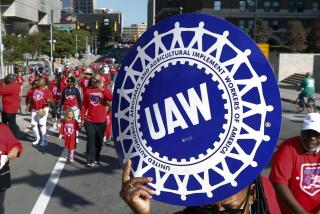German Union Members Strike
- Share via
SINDELFINGEN, Germany — The overnight shift at a major DaimlerChrysler plant on Sunday launched the first strike by Germany’s largest industrial union in seven years, one that could slow the recovery of Europe’s biggest economy.
The powerful IG Metall union said 2,000 workers at the German-American auto giant’s sprawling Sindelfingen works honored calls to stay home for the night shift, beginning one-day work stoppages at major employers in southern Baden-Wuerttemberg state, a heartland of German manufacturing.
The plant and its 25,000 workers make Mercedes-Benz C- and E-class luxury models, among the company’s most consistent profit-makers.
Leaders of the 2.7-million-member IG Metall union, which also represents workers in electronics and engineering, have said the stoppage is to spread today to U.S.-headquartered tractor maker John Deere, which has a plant in Mannheim, and car makers Porsche and Audi as well as two more DaimlerChrysler plants.
Any wage settlement in Baden-Wuerttemberg is expected to set the pattern for workers across Germany. Most contracts are negotiated between unions and regional employer associations representing entire industries.
Pay talks broke down April 19 after the union rejected employers’ offer of a 3.3% increase for 15 months. Employers say they can’t go higher, and some economists say any increase more than 3% endangers jobs and fuels inflation.
The union has said it wants a 6.5% increase as part of a one-year deal to compensate workers for moderate increases in the past, inflation and higher productivity, but observers expect it to settle for less. IG Metall members earn an average of about $1,800 a month, plus benefits including six weeks of paid vacation and bonuses.
IG Metall head Klaus Zwickel said companies may be hit repeatedly with strikes on short notice, costing them millions of dollars a day in lost business. The union has called its first strike since 1995 despite appeals from Chancellor Gerhard Schroeder for a wage deal that doesn’t snuff out the beginning of economic recovery in Germany.
More to Read
Inside the business of entertainment
The Wide Shot brings you news, analysis and insights on everything from streaming wars to production — and what it all means for the future.
You may occasionally receive promotional content from the Los Angeles Times.










